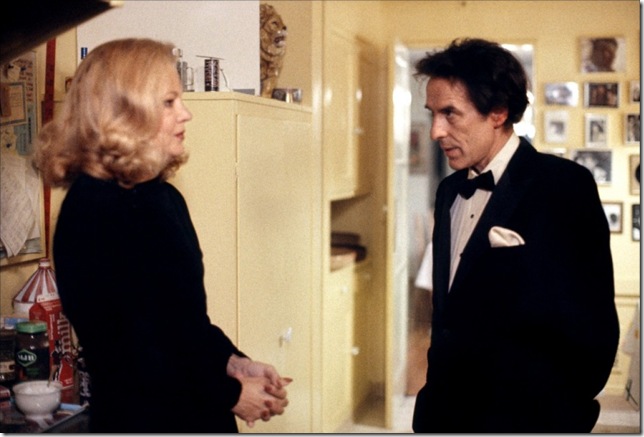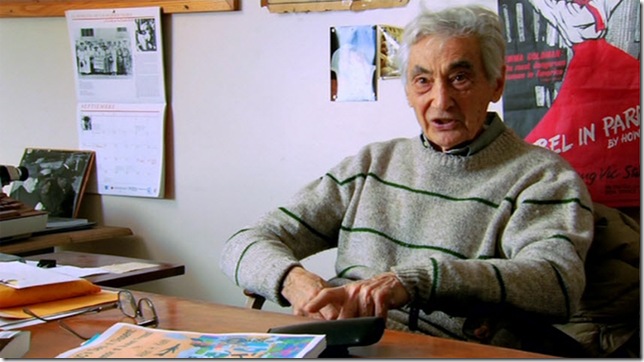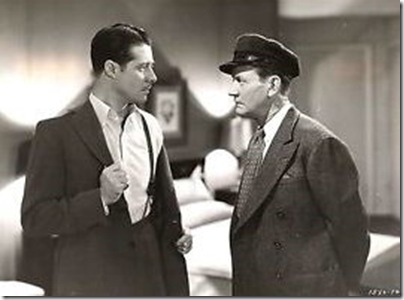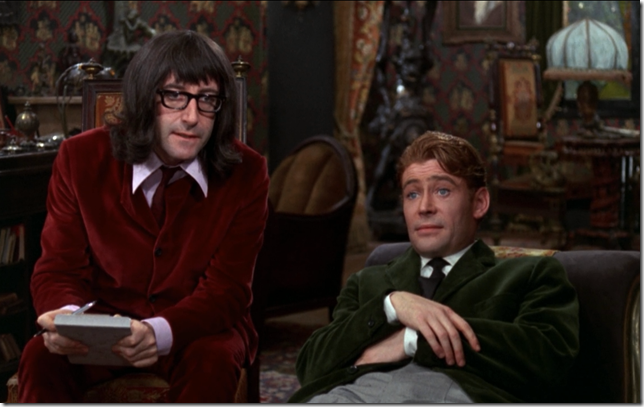Love Streams: Technically, John Cassavetes’ final film was the middling 1986 trifle Big Trouble. But 1984’s Love Streams (Criterion, $26.22, Blu-ray + DVD) is his pure swan song, the last feature made in his signature frayed-nerve style — and it’s been a long time coming on home video.
Gena Rowlands plays Sarah Lawson, a woman still under the influence, who escapes a pending divorce and child-custody battle by visiting her brother Robert (Cassavetes), a Dionysian novelist addicted to women and booze, who is himself divorced. Doctors reportedly gave Cassavetes a six-month prognosis before the film was shot, and he looks positively spectral in Love Streams — gaunt and exhausted from life’s pleasures, with perpetual bags under his eyes and facial lines where there shouldn’t be any.
His appearance is both sad to watch and, for his character, perfect: Robert mostly just prowls oddly depopulated gender-bending bars, invites gaggles of prostitutes for weekend bacchanals and passes out in the cars of women who are far too accepting of his ways. Sarah, meanwhile, trolls bowling alleys for men, impulsively buys a zooful of animals for Robert’s backyard, and passes out whenever the stress and anxiety of life becomes too much to bear.
Cassavetes adapted the story from a Ted Allan play, but the themes and textures are utterly his. Cassavetes, as Robert, all but encapsulates his entire oeuvre with the drunken remark, “Life is a series of suicides, divorces, promises broken, children smashed, whatever.” A searing portrait of middle-aged disillusionment and displacement, Love Streams is both disarmingly funny and pitifully tragic, often within the same scene.
The director’s ability to home in on moments of unscripted insight is on full display, but so is an unusual amount of stylization. In dramatizing Sarah’s wild dreams and fantasies, Cassavetes includes an artificially bloody car crash, a manic flashback, jump cuts, a baroque musical number and a hallucinogenic ballet, all of which beautifully juxtapose with the director’s trademark hyperrealism. The film’s aliveness cannot be overstated.
This Criterion set is an essential title for your collection, boasting supplements such as a 1984 hourlong documentary about the making of Love Streams, a new video essay about Gena Rowlands, an audio commentary and a 2008 interview with Seymour Cassel, who plays Sarah’s estranged husband.
Truth in Numbers? Everything, According to Wikipedia: We all realize by now that the Internet is both a blessing and a curse, and this duality finds a perfect microcosm in the form of Wikipedia, entrepreneur Jimmy Wales’ egalitarian e-encyclopedia. In this documentary (Kino Lorber, $26.96 DVD), Scott Glosserman and Nic Hill examine the sociological, economic and political impact of the website across the globe. What seems, at first, like a friendly promotional video for Wikipedia gradually yields to the site’s many decriers, and there’s a sense that the filmmakers drifted from hagiographers to critics over the course of filming interviews (Noam Chomsky, Bob Schieffer, James Woolsey and the late Howard Zinn are among the talking heads).
As these filmmakers tell it, the best defense for Wikipedia is the knowledge channels it has opened in fascist and dictatorial countries; thanks to techy Wikipedians working underground, not every Chinese needs to be kept in the dark about what happened at Tiananmen Square. But when it comes to just about everything else, the critics take the argument, even if many of them come off as Luddite cranks. The lack of editorial expertise at the helm of Wikipedia, the false equivalencies apparent in the website’s insistence on “neutrality,” and the bullying nature of its small cabal of super-writers are equally damning to the site’s reputation.
Wales himself comes off as an arrogant cult leader and ideologue; in one of the filmmakers’ wittiest editing schemes, they intercut his opinions about free-market capitalism with video from an Ayn Rand interview and from Gary Cooper’s monologue at the climax of The Fountainhead. But most disturbing of all is how easily Wikipedia has cowed to corporate and government interests at the expense of the truth.
Glosserman and Hill show us that entries on everything from Dow Chemical to 9-11 Conspiracy Theories have been “edited” by employees of these interests, with critical sections and images entirely redacted. Wikipedia may be working to liberate knowledge in other parts of the globe, but it will happily suppress it here rather than make any waves.
That’s My Man: Olive Films’ last release from the classic Hollywood master Frank Borzage ($26.96 Blu-ray, $22.46 DVD) is a rare treat indeed, a trenchant and moving melodrama that has remained unavailable to the public for some 60 years, sans a butchered hourlong cut. Olive’s release restores 1947’s That’s My Man to its proper 99-minute running time.
Don Ameche stars as a Joe, an accountant and dormant high-stakes gambler who, on an impulsive Christmas Eve, quits his job and purchases a colt, intending to fulfill a lifelong dream of raising a racehorse. Thrown out of his residence, he and his horse, aka “Gallant Man,” meet cute with a soda-fountain girl (Catherine McLeod) with big dreams. They share a cab, then her apartment, then a life together, with Gallant Man beating the odds to become the winningest horse on the circuit. But when Joe’s gambling habit degenerates into an addiction, it torpedoes his marriage.
This breaking-bad narrative — thanks to the thrill of the dice and the racetrack, he misses parties, holidays and his son’s birth — was ahead of its time for ‘47, ditto Borzage’s virtually unparalleled penchant for realism and moral ambiguity. Joe’s integrity for his horse’s wellbeing — he retires Gallant Man early after the authorities rule that the horse must bear a 140-pound weight as a handicap — is as poignant as his relationship with his wife is neglectful. In Borzage’s world, as in ours, a person can have a corrupt moral character and still be an inspiring, American Dream success story. And the possibility for redemption can hide in even the darkest corners of the soul. Full of compassion, empathy and plenty of shades of gray, this is a profoundly adult movie.
What’s New, Pussycat?: Britain’s Clive Donner directed this 1965 French-set sex farce (Kino Lorber, $10.99 Blu-ray), from Woody Allen’s first produced screenplay, and it’s a shambling, tousled mess.
Peter O’Toole is Michael James, playboy philanderer and lecherous fashion magazine editor, whose attempts to settle down with partner Carole (Romy Schneider) are thwarted by a revolving door of bonkers beauties, including Paula Prentiss’ pill-abusing American and Capucine’s certifiable nymphomaniac. Michael can’t avoid them: In the case of Ursula Andress’ professional parachutist, they literally fall from the skies and into his vintage Le Mans.
An exhaustible, painfully unfunny Peter Sellers, as a sex-starved psychoanalyst, and Woody Allen, as a free-spirited proto-nebbish, enjoy minor subplots, until everything comes to a, um, climax in an orgiastic chalet, all slammed doors and scanty women and buffoonish men. What few laughs endure in this antiquated, swingin’ ’60s time capsule suggest Allen’s future greatness, like the early scene in which he frantically tries to dress strippers backstage at the Crazy Horse while trying to court them by discussing Toulouse-Lautrec; later, there’s a clever and subsequently stolen postmodern gag that employs on-screen text. Mostly, though, this is a stupid, sexist, déclassé affair.



